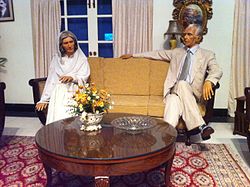Fatima Jinnah (1893-1967) was a prominent figure in the history of Pakistan and a pioneer for women's rights in the country. Born on July 30, 1893, in Karachi, British India, she was the younger sister of Pakistan's founding father, Muhammad Ali Jinnah. Fatima Jinnah received her early education in Bombay and Calcutta and later pursued her medical studies at the University of Calcutta. However, due to the untimely death of her father in 1901, her education was interrupted, and she had to return to Karachi.
Despite facing societal expectations and conservative norms that discouraged women from pursuing higher education and careers, Fatima Jinnah was determined to excel and contribute to society. In 1919, she traveled to England to continue her medical studies at the University of London. There, she became the first Muslim woman to qualify as a dentist. However, she did not pursue a medical career actively but instead focused on supporting her brother, Muhammad Ali Jinnah, who was becoming increasingly involved in India's nationalist movement.
Fatima Jinnah's political journey began when she returned to India in 1929, where her brother encouraged her to join the All-India Muslim League, an influential political organization that sought to advance the interests of Muslims in British India. As her brother's closest confidante and advisor, she played a crucial role in supporting him during the critical years leading up to the creation of Pakistan in 1947.
During the struggle for independence, Fatima Jinnah emerged as a prominent political figure in her own right. She actively participated in the Khilafat Movement and the Non-Cooperation Movement, which aimed to resist British colonial rule through nonviolent means. Her association with her brother, who was the driving force behind the demand for a separate Muslim state, significantly bolstered her political standing within the Muslim League.
With the partition of India and the creation of Pakistan in 1947, Fatima Jinnah continued to play a vital role in the nascent nation's politics. She supported her brother's vision of a democratic and inclusive Pakistan. In 1948, after Muhammad Ali Jinnah's death, she faced the challenging task of keeping his legacy alive and carrying forward his vision for the country.
In 1965, Fatima Jinnah made a historic decision to contest the presidential elections against General Ayub Khan, who had come to power through a military coup in 1958. This was a groundbreaking move as she was the first woman in Pakistan's history to run for the highest office in the country. Her candidacy galvanized the nation, with people from all walks of life rallying behind her, seeing her as the torchbearer of her brother's ideals and the embodiment of women's rights and empowerment.
During her election campaign, Fatima Jinnah focused on issues such as good governance, civil liberties, and social welfare. Her vision for Pakistan emphasized the importance of democracy, human rights, and women's empowerment. She called for an end to martial law, the restoration of the 1956 constitution, and a return to civilian rule.
The election campaign was not without challenges, and allegations of electoral malpractices were rampant. Despite the odds stacked against her, Fatima Jinnah's campaign became a symbol of resistance against military rule and the desire for a democratic Pakistan. Her candidacy ignited hope and inspiration among women, and her resilience and determination inspired many to challenge the patriarchal norms and gender barriers prevailing in society.
In the 1965 elections, Ayub Khan was declared the winner amid controversy and accusations of vote-rigging. Fatima Jinnah rejected the results, alleging electoral fraud, and challenged the outcome in court. Though her legal challenge did not succeed, her bold stance against the military regime resonated with the public and helped pave the way for future democratic movements in Pakistan.
Fatima Jinnah's political career and her presidential campaign marked a significant turning point for women in Pakistani politics. Her candidacy brought women's issues to the forefront and highlighted the need for equal participation and representation in governance. She shattered stereotypes and set a precedent for women to actively engage in politics and pursue leadership positions.
Despite her loss in the election, Fatima Jinnah remained an influential political figure until her death in 1967. Her contributions to Pakistan's history and her advocacy for women's rights and democratic values continue to inspire generations of Pakistanis.
In conclusion, Fatima Jinnah's political career spanned decades and left an indelible mark on the history of Pakistan. From being a steadfast supporter of her brother during the struggle for independence to becoming a symbol of resistance against military rule, she played a crucial role in shaping the trajectory of the nation. Her legacy as a trailblazer for women's rights and her unwavering commitment to democracy and social justice make her an icon in Pakistan's history.


.jpg)


.jpg)
.jpg)

No comments:
Post a Comment